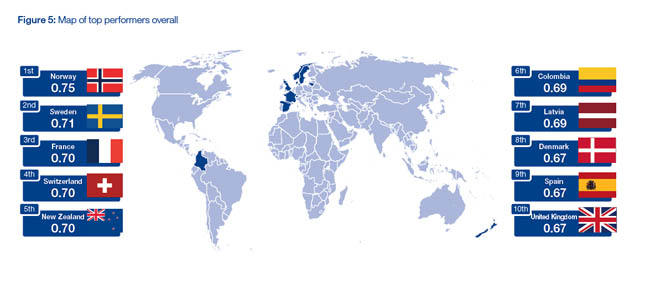Norway, Sweden and France have taken the top three spots, while Ireland has taken 13th position, in the World Economic Forum’s latest Global Energy Architecture Performance Index Report that has rated the energy systems of 105 countries from an economic, environmental and energy security perspective.
The report, released today by the World Economic Forum (WEC), aims to create a set of indicators that help to highlight the performance of various countries across each facet of their energy systems.
It said the purpose of the index is to help countries become better positioned for the transition that is anticipated in energy systems globally.
According to the International Energy Agency, US$38trn of investment in energy supply infrastructure will be needed by 2035 to meet rising global demand.
The WEC assessed energy systems across three objectives: delivering economic growth; doing so in an environmentally sustainable way; and ensuring security of supply and access for all.
Energy outlook
Its main findings from the analysis of the 105 countries surveyed is that high-income countries are leading the transition to a new energy architecture but still have work to do on environmental sustainability.
Norway was ranked first in the index for its strong energy policy plus its use of multiple energy resources to deliver cheap and relatively clean power.
Sweden and France were ranked second and third respectively, while Switzerland was ranked in fourth place and New Zealand came in at fifth position. The other countries that made up the top 10 were: Colombia (sixth); Latvia (seventh); Denmark (eighth); Spain (9th); and the UK (10th).
Meanwhile, Ireland also ranked highly in the Global Energy Architecture Performance Index, with the WEC placing it in 13th position.
The US ranked 55th in the report, while of the BRICS, Brazil takes the lead in 21st place, followed by the Russian Federation (27), South Africa (59), India (62) and China (74).

Sustainability
However, the WEC found that both high-income economies and rapidly growing countries alike are often underperforming across a range of environmental sustainability metrics.
This comes as countries’ demand for energy is increasing rapidly, with economies having to take their renewable energy obligations and CO2 targets into consideration.
“Energy decisions can be simplified through a common understanding of the trade-offs they require,” said Roberto Bocca, senior director, head of energy industries at the WEC.
“With clear objectives to achieve a balanced energy system that is environmentally sustainable, drives the economy and is secure, decision-makers should facilitate quicker and more cost-effective transitions. The index is a tool to help in this process,” he said.
The report also found that many developing countries are still battling to supply citizens with basic energy needs. For instance, the WEC found that 12pc of the countries analysed provide electricity to less than 50pc of their total population.
As well as this, it looks at energy-related issues such as fossil fuel subsidies and the use of water for energy production.
Sustainable energy image via Shutterstock